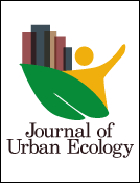
Jill E. Spear, Erik K. Grijalva, Julia S. Michaels, Sophie S. Parker
This paper discusses the impact of urban-dwelling plants and animals on regional wildland populations, both within and across species. The authors reviewed the global conservation literature and identified seven ecological processes that have the potential to be affected by spillover from urban to wildland areas. However, because very few studies explicitly analyze these effects, organisms living in urban areas have largely unknown wildland impacts. This paper provides a framework for analyzing ecological spillover from urban to wildland areas, identifies critical gaps in knowledge on the topic, and prioritizes future research that might illuminate this important aspect of 21st century conservation planning.
ViewNisi A, H Welch, S Brodie, C Liephardt, R Rhodes, E Hazen, JV Redfern, TA Branch, A S Barreto, J Calambokidis, T Clavelle, L Dares, A de Vos, S Gero, J A. Jackson, RD Kenney, D Kroodsma, R Leaper, DJ McCauley, SE Moore, E Ovsyanikova, S Panigada, CV Robinson, T White, JR Wilson, B Abrahms
Collisions between whales and ships are a leading cause of death for threatened whale species across the globe. In this paper, scientists identified high risk areas for whale-ship collisions by…The Nature Conservancy
In 2013, sea star wasting disease led to the collapse of sunflower sea stars (Pycnopodia helianthoides) along the west coast of North America. Animals are now being grown in captivity for eventual…Michael J Clifford, Peter Gower, Tanya Anderson, Jaina Moan, Mickey Hazelwood, Sophie S Parker, Laurel Saito
Dramatic changes to the transportation and energy sectors are required to reduce greenhouse gas emissions and meet the goal of keeping global average temperatures from rising. The authors discuss how…Bryan DeAngelis, Elliot Hall
We must radically increase the pace, scale, and impact of restoration to recover the abundance, resilience, and benefits of coastal ecosystems. This project explored the current size of the…Carrie A. Schloss, D. Richard Cameron, Bradley Franklin, Christoph Nolte, Scott A. Morrison
In response to biodiversity declines worldwide, over 190 nations committed to protect 30% of their lands and waters by 2030 . As these jurisdictions move from planning to implementation, we propose a…Erin. E. Conlisk, Gregory H. Golet, Mark D. Reynolds, Nathan Elliot. and Matthew E. Reiter
Shorebirds are the second fastest declining group of birds in North America. To reverse this trend, The Nature Conservancy has been implementing BirdReturns, a habitat incentive program that pays…William T. Bean, H. Scott Butterfield, Jeanette K. Howard, Thomas J. Batter
In this paper, the authors used a variety of habitat suitability modeling approaches to begin to understand where pronghorn may exist in the future in California under different climate change…Lucy Genua, Brad Anderson, Meghan Bowen, Genelle Ives, Owen Liu, Thomas Paschos, H. Scott Butterfield, Kelly Easterday, Mark Reynolds, James H. Thorne
In this paper, the authors used historical vegetation data, from both aerial photographs and field transects, to assess the change in major vegetation types at the Dangermond Preserve over the last…Kate Kauer, Lyall Bellquist, Jenn Humberstone, Vienna Saccomanno, Dwayne Oberhoff, Sherry Flumerfelt, Mary Gleason
This 2024 paper by TNC staff and partners represents the first U.S.-wide synthesis of fisheries trusts – which are community-based entities that acquire and manage fishery privileges with the…Michael J. Clifford, Sophie S. Parker, Laurel Saito, Brian S. Cohen, Naomi S. Fraga
Lithium batteries are important for the clean energy transition in the United States because they are used in electric vehicles and for grid power storage. However, lithium extraction may have impacts…Nicholas A. Povak, Patricia N. Manley, Kristen N. Wilson
This study presents a methodology to integrate spatial assessments of current and future forest conditions to understand the potential to achieve desired conditions under climate change with ongoing…Sophie S. Parker, Michael J. Clifford, Brian S. Cohen
To address climate change, the United States is incentivizing the production of electric vehicles containing domestically derived lithium batteries. Extracting this lithium may have environmental…Michael Clifford, Sophie Parker, Matt Rader, Lydia Bailey, Naomi Fraga, Chris Hass, Estella Hernandez, Jan Kempf, Lois Merkler, Michael Swink
The Amargosa River supports one of the most outstanding suites of endemic and imperiled species in the world. In 2019, TNC acquired the Atwood Preserve in the river’s headwaters, the…Claire L. Schollaert, Jihoon Jung, Joseph Wilkins, Ernesto Alvarado, Jill Baumgartner, Julien Brun, Tania Busch Isaksen, Jamie M. Lydersen, Miriam E. Marlier, Julian D. Marshall, Yuta J. Masuda, Charles Maxwell, Christopher W. Tessum, Kristen N. Wilson, Nicholas H. Wolff, June T. Spector
By modeling six scenarios of forest management, wildfire, and health impacts from smoke from 1981-2020, we found that moderate amounts of prescribed fire can decrease harmful particulate matter…William T. Bean, H. Scott Butterfield, Craig Fiehler, David Hacker, Jeanette K. Howard, Russell Namitz, Brandon Swanson, Thomas J. Batter
TNC launched a Water for Wildlife project motivated by understanding the importance of standing free water across the season for wildlife in general, but most importantly for those species sensitive…Michael J. Clifford, Sophie S. Parker, Brian S. Cohen, Elaine York, Joel Tuhy
This paper provides an assessment of changes in the conservation value of lands in the Mojave Desert of Nevada and Utah resulting from renewable energy and other development between 2010 and 2018. The…The Nature Conservancy with Willis Towers Watson, Sarah Heard
California has the highest wildfire risk in the US, and climate change will continue to exacerbate the risk, at least in the foreseeable future. As a result, California is facing an insurance crisis,…